Marsala wine is a fortified wine that is produced on the Italian island of Sicily, near the town of Marsala. When wine is fortified, it means brandy or a neutral grape spirit is added to wine, which stops the fermentation process. When this happens, the wine retains more residual sugar, thereby making it sweeter. Historically, fortification was used to preserve wine for long sea voyages. Today, the method continues to be used because it adds distinct flavors to the wine as well as the foods it is prepared with.
Marsala wine is gluten free and contains no grain products. It is made with a blend of grapes and fortified with a spirit such as brandy. Marsala wine is sold as a wine or as a cooking wine. The best gluten-free alternatives to Marsala wine include Blandy’s Rainwater Madeira, Dry Sack Sherry, and Nonna Pia’s Balsamic Glaze.
In this article, we will discuss how Marsala wine is made, its potential health benefits, and how it is typically used. We will then go over some common Marsala wines available on the market. Finally, we will review some gluten-free alternatives that you can try in your next dish that calls for Marsala wine. Let’s dig in!
Contents
How is Marsala Wine Made?
Marsala wine is made with a blend of grapes and fortified with a spirit such as brandy. The process of fortifying wine was used to preserve wine and prevent it from spoiling by increasing the alcohol content. During winemaking, the wine undergoes a process called fermentation. This is a chemical reaction that occurs when yeast converts the sugar from the grapes into alcohol and carbon dioxide. Distilled spirits like brandy are then added which is the fortifying stage of the winemaking process. This gives Marsala wine higher alcohol content, typically 15-20%.
Depending on the winemaker’s desire for sweetness in the wine, the spirits are added at different times. If the spirits are added before the fermentation process is complete, the wine will have more residual sugar and thus will have a sweeter taste. If the spirits are added after the fermentation process is complete, the result will be a less sweet or drier wine with lower sugar content. Other examples of fortified wine include Port wine, sherry, Madeira, and vermouth.
How is Marsala Wine Used?
Marsala wine can have different degrees of sweetness such as dry, semi-sweet, and sweet. They are also classified by age. Younger wines are typically used for cooking while older wines are ideal for sipping before or after a meal. The taste of Marsala wine has a range of flavors such as brown sugar, vanilla, dried fruit, and nuts.
- The drier Marsala wine can be used in savory dishes with turkey, veal, mushrooms, and beef.
- A sweeter Marsala wine can be used with chicken and pork dishes or used to make sweet sauces.
- It also pairs well with desserts like tiramisu or cheesecake and can be used in recipes like Chicken Marsala or Mushroom Marsala Risotto.
Are There Health Benefits in Marsala Wine?
Similar to red wine, Marsala wine has health benefits as well. It is high in antioxidants, which help neutralize free radicals and protect against disease. It supports heart health by increasing levels of HDL, which is good cholesterol and helps reduce the risk of heart disease. However, Marsala wine is higher in calories, sugar, and alcohol content so it is important to use it in moderation. The Marsala cooking wine also contains a high amount of sodium and preservatives.
What Are Some Marsala Wine Brands?
When shopping for Marsala wine, you will find Marsala wine and Marsala cooking wine. The Marsala cooking wine may be cheaper, but it is not as flavorful. The cooking wine usually contains a lot of sodium and can sometimes alter the taste of your dish. To get a more complex and rich flavor in your food, opt for the real Marsala wine instead of the Marsala cooking wine.
Holland House Marsala Cooking Wine
This Marsala cooking wine has a rich golden color with a hint of hazelnut. It pairs well with Italian pasta dishes and creamy soups. It contains a high amount of sodium and preservatives.
Ingredients:
- Wine
- Salt
- Potassium Sorbate (preservative)
- Potassium Metabisulfite (preservative)
Nutrition Facts (per 2 Tbsp. 30mL):
- Calories: 45
- Total Fat: 0g
- Trans Fat: 0g
- Sodium: 190mg (8% DV)
- Total Carbohydrate: 4g (1% DV)
- Sugars: 4g
- Protein: 0g
Reese Vintage Marsala Cooking Wine
This is a Kosher-certified Marsala cooking wine that is aged in wooden casks to develop flavor. As the previously mentioned Marsala cooking wine, it contains a high amount of sodium and preservatives.
Ingredients:
- Marsala Wine
- Salt
- Malic Acid
- Potassium Sorbate (preservative)
- Sodium Metabisulfite (preservative)
Nutrition Facts (per 2 Tbsp. 30mL):
- Calories: 45
- Total Fat: 0g
- Trans Fat: 0g
- Sodium: 180mg (8% DV)
- Total Carbohydrate: 2g (1% DV)
- Sugars: 2g
- Protein: 0g
Serra Mission Marsala Wine
This Marsala wine is produced in California. It has flavors of caramel with hints of brown sugar, spices, and herbs. It is best served chilled before a meal or with food preparation.
Ingredients:
- 100% California Grapes
- Brandy
- Contains sulfites
Nutrition Facts:
- Information not available
Florio Marsala Superiore Sweet 2018
Florio has been based in Sicily since 1833. This sweet Marsala wine is more expensive and can be used for cooking, as well as sipping after dinner. It has a dark amber color and strong aroma with notes of dates and apricots. It has been aged 24 months in oak casks, which is one of the secrets of quality Marsala wine. It goes well with desserts and soups and enhances chicken, veal, and root vegetable dishes.
Ingredients:
- Grillo and Cataratto White Grapes
- Fortified Must
- Cooked Grape Must
- Wine Brandy
- Contains sulfites
Nutrition Facts:
- Information not available
Alcohol-Based Alternatives to Marsala Wine
Madeira Wine
Madeira wine most likely resembles Marsala wine in terms of color and flavor and works as a suitable alternative. Madeira wine originated in Portugal and also ranges in flavor from sweet to dry. It is fortified and aged like Marsala wine, but the main difference between the two wines is the grape varieties. Five different grape varieties are used to make Madeira wine so it embodies a variety of flavors such as roasted nuts, stewed fruit, caramel, and toffee.
Blandy’s Rainwater Madeira
This is a medium-dry Madeira wine with a soft fruit and dry nutty quality. It is made from a variety of grapes such as Tinta Negra, Sercial, Verdelho, Boal, or Malmsey.
Ingredients:
- Tinta Negra grapes
- Sercial grapes
- Verdelho grapes
- Boal grapes
- Malmsey grapes
Nutrition Facts:
- Information not available
Dry Sherry Wine or Vinegar
Also a fortified wine, dry sherry differs in flavor, complexity, and alcohol content from Marsala, but it offers a similar result in food preparation. Make sure to use the actual sherry wine and not the cooking wine to achieve the best flavor in your recipe as the cooking wine contains a lot of sodium.
Sherry vinegar is made from sherry wine. It is however not as sweet as the wine, but more acidic with subtle caramel notes. For savory dishes, you could mix together 2 tablespoons sherry vinegar, ¼ cup grape juice, and 1 tablespoon vanilla extract for added flavor.
Dry Sack Sherry
This is a medium-dry sherry from Spain with an amber color, walnut aroma, and flavors of butter almond, toffee, and citrus. It is made from a blend of palomino grapes from southern Spain and aged in oak casks.
Ingredients:
- Blend of palomino grapes
Nutrition Facts:
- Information not available
Columela Sherry Vinegar
- Columela Sherry Vinegar
Nutrition Facts (per 1 Tbsp. 15mL):
- Calories: 0
- Total Fat: 0g
- Trans Fat: 0g
- Sodium: 0mg
- Total Carbohydrate: 0g
- Protein: 0g
Non-Alcoholic Alternatives to Marsala Wine
White or Red Grape Juice
If you are looking for a non-alcoholic gluten-free alternative to Marsala wine, grape juice works very well as a replacement. In desserts, you could use grape juice by itself. As a great option for savory dishes and mentioned above with the sherry vinegar, you could mix together ¼ cup grape juice, 2 tablespoons sherry vinegar, and 1 tablespoon vanilla extract and use it as a substitute for Marsala wine as well.
Santa Cruz Organic White Grape Juice
 This juice is gluten-free, 100% organic, and non-GMO.
This juice is gluten-free, 100% organic, and non-GMO.
Ingredients:
- Filtered Water
- Organic White Grape Juice Concentrate
Nutrition Facts (per 8 fluid ounces 240mL):
- Calories: 160
- Total Fat: 0g
- Sodium: 20mg (1% DV)
- Potassium: 270mg (8% DV)
- Total Carbohydrate: 39g (13% DV)
- Sugars: 37g
- Protein: Less than 1g
- Calcium: 4%
- Iron: 4%
Balsamic Glaze
Balsamic glaze is the result of balsamic vinegar and a sweetener such as honey, maple syrup, or brown sugar cooked down until it turns into smooth syrup. Balsamic vinegar is intensely flavored as it is made from grape must that contains all the skins, seeds, and stems of the grapes. It is known for having bold, complex, and distinct flavors which are great for substituting Marsala wine. Balsamic glaze has an intense flavor with a sweet and tangy aftertaste, so a little goes a long way.
Nonna Pia’s Balsamic Glaze
 This balsamic glaze is gluten-free, non-GMO, and contains no added thickeners.
This balsamic glaze is gluten-free, non-GMO, and contains no added thickeners.
Ingredients:
- Balsamic Vinegar of Modena, Italy
- Granulated Cane Sugar (non-GMO)
- Contains naturally occurring sulfites
Nutrition Facts (per 2 tsp. 10mL):
- Calories: 40
- Calories from Fat: 0
- Total Fat: 0g
- Cholesterol: 0mg
- Sodium: 0mg
- Potassium: 0mg
- Total Carbohydrate: 11g (4% DV)
- Dietary Fiber: 0g
- Sugars: 7g
- Protein: 0.1g
Related Questions
Is Marsala wine keto-friendly?
No, Marsala wine is not keto-friendly as it contains carbohydrates and sugar. If you would like a substitute that has a similar taste profile with fewer carbohydrates, you could try sherry wine or vinegar.
Is Marsala wine paleo-friendly?
In short, wine is considered paleo-friendly, as it was a drink consumed by our ancestors. However, a lot of modern wines are highly processed with added white sugar, commercial yeasts, purple coloring, and phthalates. If you follow a paleo diet and want to enjoy an occasional glass of wine, choose natural and organic wines that do not contain those added ingredients, and were not produced with potentially harmful pesticides, herbicides, and fungicides. In other words, you might have to do some extra research before purchasing a bottle of wine.
Is Marsala wine only for cooking?
No, Marsala wine can also be sipped on before a meal as an aperitif to stimulate the appetite or after a meal as a digestif to aid digestion. Another delicious way to enjoy Marsala wine is to drink it with dessert. However, look for the real Marsala wine and avoid labels that say Marsala cooking wine as it will contain more sodium and not taste as good.

